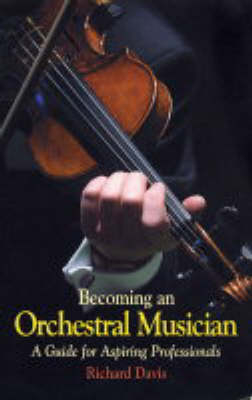
Becoming an Orchestral Musician
Giles de la Mare Publishers (Verlag)
978-1-900357-23-4 (ISBN)
Becoming an Orchestral Musician takes you on a journey into the musical profession. It is the first comprehensive guide for professional musicians on how to succeed in joining an orchestra or ensemble, and how to survive as an orchestral musician. Such crucial topics as how to obtain the right tuition, music college versus university, auditioning, nerves, the secrets of ensemble playing and intonation, conductors, the mechanics of the orchestra, performing philosophies and strategies for survival are covered in separate sections. The matter of how to explore and adapt one's musical psyche, the pitfalls of a career in music and the highs and lows of performing are also discussed. The history, mythology and science of music-making and numerous anecdotes provide a vivid background. It is essential reading for all orchestral musicians, including players of every instrument, whether at college or university or during their career, whether full-time or part-time, and whether professional or amateur, and also for the parents of budding instrumentalists. There are probably more orchestras and ensembles in the length and the breadth of Britain today than ever before.With the renewed recognition in schools of the importance of music, the competition among younger musicians has become intense.
Schools and colleges need to be well informed about career guidance for their students. Richard Davis's book will give the answers to many of the questions those students will be asking. It has been warmly welcomed by his colleagues in the BBC Philharmonic, and by other musicians, too. Twenty of them have been interviewed by him specially for it on their experiences and on advice they would like to give to younger musicians on many different themes. They include principals and rank and file players, soloists, academics, music critics, fixers, chamber musicians and people involved in management.
Richard Davis is principal flute of the BBC Philharmonic, and also Senior Lecturer and an orchestral coach in the Royal Northern College of Music. He was the youngest section principal ever to be appointed. He has played in virtually all the major orchestras in Britain in his time, and he is active as a conductor, too. A number of composers have written flute works specially for him, including Sir Peter Maxwell Davies with his Temenos with Mermaids and Angels. After twenty years' playing as principal, he has decided that he would like to pass on his knowledge and experience of the profession to a new generation of performers, together with many secrets he has learnt in his career in performing. Blurd
page Preface by Sir Peter Maxwell Davies vii Prologue 1 Foreword 3 Acknowledgements 7 1 Introduction to the Orchestral Profession 13 What Are the Chances of Success? 2 The Formative Years 19 Persistence, Music Competitions, Is Your Teacher Right for You? Quality of Instrument, How Dear Can They Be? Stolen Instruments, Wrong Notes, Learn the Score, Goals, Play Music With and For People, Music School, You Are Not Doing Enough Practice! Warming Up, Injuries, Music College...,... Or University? Are You Sure You Want to Do This? The Right Personality, After College 3 Performing Philosophies 43 A Musical Vision, The Je Ne Sais Quoi, The Journey, Singers in the Coffee Queue, Learn to Conduct, The Composer's Condensed Universe, Style, The Bar, CD Culture, How Many Takes Does It Take? Study or Mimic, Soul Music 4 Auditions 52 When Should You Start Applying? Students, CV Versus Resume, The Audition Loophole - Back Door, The Audition, The Panel, How Long Will I Be in There? What Are We Looking For in an Audition? Orchestral Excerpts, What Do You Do with the Bars' Rest? Sight-Reading, The Truth About Sight-Reading in the Profession, Audition Nerves, The Warm-Up Room, Rumours, Auditions for Extra Work, Subsidiary Instruments, Pre-Audition, Post-Audition, Rejection Letter, At What Point Should I Quit? 5 Ensemble 85 All Orchestras Are Different, Know Your Role, Accompanying, Blending, Vibrato, Note-Endings, Articulation, Rhythm, Rubato, Dynamics, ppp-fff, Back-Desk Soloists, Finally 6 Nerves 112 Why Do You Get Nervous? Practice, Nerve Targets, Split It Up, Visualization, Don't Worry..., The Public, The Performing Circle, Red-Light Nerves, Re-takes, Nerves: the 'Virus', Diet, Drugs, Alcohol, Lucky Charms, Controlling Your Nerves Before the Performance, Controlling Your Nerves During the Performance, Still Nervous? Should You Give Up? Towel in the Bidet 7 Counting 133 Look Out, The Domino Factor, Counting Strategies, What Do You Do? Sounds Wrong? Sounds Right? Not Sure? Asking for Help, Still Lost, Emergency Mode, Count Upwards, Complex Music Shouldn't Mean Complicated Counting, You Are Not Alone, Lost Souls 8 Conductors 143 The Player's Wish: A Clear Up-Beat, Do You Know Exactly When You Are About to Play? Upsetting the Apple Cart, What Difference Do Conductors Make? Bad Conductors, Why We Need Them, Where Did They Come From? Conductors' Traits, How to Cook a Conductor, The Baton Makes No Sound, There Are Wonderful Conductors, Too, When to Play, a Possible Answer 9 Intonation 156 Science Lesson, Hearing, Natural Harmonics, Harmonic Mixtures, Maths Lesson, Singing Lesson, Making Cents, History Lesson, Pythagorean Tuning, Meantone Tuning, Well-Tempered Tuning, Equal Temperament Tuning, Orchestral Temperament, Warning! Practical Experiment, Wolves and Ghosts, Second Maths Lesson, The Oboe's A, Tuning Up Orchestras, Which is Best: Sharp or Flat? Tuning Tips, Still Out of Tune? How Much Work? 10 The Mechanics of the Orchestra 185 Behind the Scenes, How Much Does an Orchestra Cost to Run? Do Any Orchestras Make a Profit? The Duty Sheet, We Don't Work Very Hard! Maintenance, 'Cello Strings, Oboe Reeds, Bumping, Breathing and Bowing, Transposing Instruments, How to Transpose, The Clarinet Problem, The Union, Rotation in the Ranks, Working Your Way Up the Ranks, What Are We Worth? 11 Surviving in the Orchestral Profession 205 Being Booked, The Fixer, A Fixer's Top Tips, The Route to Work, All Those Notes to Learn, Networking and Common Mistakes, Keeping in Shape, Waiting in the Green Room, Tours, Holidays, Survival Tips 12 Alternative Careers 220 Chamber Music, Strike Up the Band, Original Instruments, Management or Administration, Music Critic Epilogue 230 Index 233
| Erscheint lt. Verlag | 18.11.2004 |
|---|---|
| Vorwort | Sir Peter Maxwell Davis |
| Zusatzinfo | 17 line illustrations & 11 musical examples |
| Verlagsort | London |
| Sprache | englisch |
| Maße | 138 x 216 mm |
| Gewicht | 449 g |
| Themenwelt | Kunst / Musik / Theater ► Musik |
| Sozialwissenschaften ► Pädagogik ► Berufspädagogik | |
| ISBN-10 | 1-900357-23-2 / 1900357232 |
| ISBN-13 | 978-1-900357-23-4 / 9781900357234 |
| Zustand | Neuware |
| Haben Sie eine Frage zum Produkt? |
aus dem Bereich


